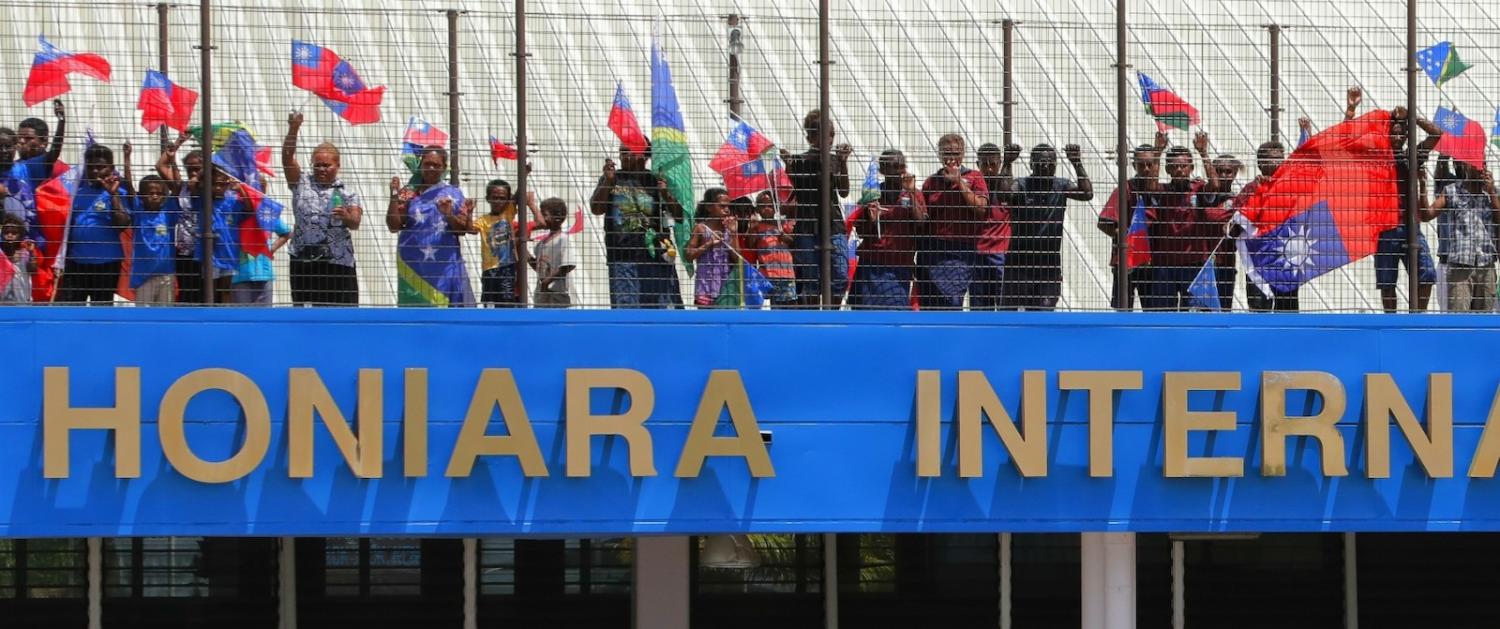The forthcoming national elections in Solomon Islands in April have once again raised the issue of diplomatic relations between the Republic of China (hereafter “Taiwan”) and Solomon Islands. Prime Minister Rick Hou’s political party has said it will review Solomon Islands diplomatic relations with Taiwan if elected, raising the potential of a diplomatic switch from Taiwan to the People’s Republic of China (hereafter “China”).
The Pacific is the second largest concentration of Taiwan’s diplomatic allies. Taiwan’s President Tsai Ing-wen will this week embark on a regional visit, highlighting that six (Kiribati, Marshall Islands, Nauru, Palau, Solomon Islands, and Tuvalu) of the 14 Pacific island countries recognise Taiwan. This accounts for more than one-third of Taiwan’s 17 diplomatic allies globally.
Yet since 2016, the diplomatic tug-of-war between China and Taiwan has intensified, which is inevitably affecting the Pacific region.
Next Thursday I’ll travel to #Palau, #Nauru, & #MarshallIslands. Bound together by the Pacific Ocean & democratic values, I look forward to celebrating the friendship between #Taiwan & our Austronesian families! pic.twitter.com/sRak9suZOf
— 蔡英文 Tsai Ing-wen (@iingwen) March 12, 2019
Solomon Islands has remained Taiwan’s diplomatic ally since March 1983. It opened an embassy in Taipei in May 2005. Taiwan has provided substantial aid to sectors such as agriculture, education, and health in Solomon Islands. One example is Taiwan’s financial support to the Rural Constituency Development Fund. It was reported that in 2017 Taiwan disbursed $29.3 million to this fund. In return, Solomon Islands has voiced support for Taiwan’s participation in the United Nations bodies.
However, official statements from Solomon Islands leaders in recent years indicate things could change. In May 2013, then prime minister Gordon Lilo emphasised that China’s rise could not be ignored but must be factored into Solomon Islands’ trade and foreign relations. In December 2014, his successor Manasseh Sogavare hinted at a possible switch to China.
Much closer economic ties with China than Taiwan and China’s rise in the Pacific region could be two main drivers of Solomon Islands’ possible diplomatic switch. According to the World Bank, China was Solomon Islands’ largest export market, absorbing 65.2% or US $326 million of Solomon Islands’ total exports in 2017. Timber constituted 94.5% of Solomon Islands’ total exports to China in that year, with a value of US $308 million.
Interestingly, on its official website, the embassy of the Republic of China (Taiwan) in Solomon Islands excludes China as a main trading partner of the Pacific country, which might be a deliberate move to downplay China’s importance to Solomon Islands.
China’s largesse to its eight Pacific allies in the form of aid and investment also appeals to Solomon Islands officials. In June last year, a delegation comprised of Solomon Islands ministers of transport and mining John Garu and Bradley Tovusia, as well as one opposition party MP, visited China to discuss China’s future investment in Solomon Islands’ mining industry.
There is some deeply entrenched support to switch to China by prominent Solomon Islanders who are former politicians. They have visited China and have close associations with Chinese business houses in Solomon Islands who still retain strong links with businesses and families in China.
There have also been several discussions on social media in Solomon Islands, especially by the younger generation, on the question of whether Solomon Islands will switch to China because of the increasing economic ties that it has with China. The role that trade and commerce is playing in shaping this view is only one of the factors that is driving this new development. There is some deeply entrenched support to switch to China by prominent Solomon Islanders who are former politicians. They have visited China and have close associations with Chinese business houses in Solomon Islands who still retain strong links with businesses and families in China.
It would be a mistake however to underestimate the extent of Taiwan’s influence with the local political elite. Taiwan’s engagement with Solomon Islands has very much focused on the elite, hosting high-level visits by government ministers, the prime minister, the governor general, and other senior government officials to Taiwan. These visits have fostered a relationship that cannot be underestimated.
Furthermore, there is a fund that Taiwan can release upon request from the Solomon Islands prime minister. These discretionary funds are very important to the local political elite and losing such access might also weigh on the minds of those who are likely to be making the decisions on diplomatic relations.
Solomon Islands therefore faces a dilemma. But rather than seeing its close economic, trade, and commercial relations with the Chinese as a negative, there are huge opportunities for the Solomon Islands government to develop programs that would protect locals by requiring equity in business relations. This could involve leveraging land leases to properties owned by indigenous Solomon Islanders and allow locals to also become partners in business.
This could ensure the connection and relationships are truly integrated in ways that would be of mutual benefit. It might also be argued that a relationship with China might lend itself to bringing some control over the migration of the new wave of Chinese and facilitate the requirements for law enforcement.
There has also been some concern about the overwhelming dominance of the Chinese in Solomon Islands, taking over land and businesses that are reserved for indigenous Solomon Islanders. Part of the problem stems from the perceived weakness in state institutions and levels of corruption that have perhaps allowed this to happen. Another concern is the likely ramifications that might arise from the trade-offs in opening up Solomon Islands natural resources in return for investments in infrastructure.
Such concern is genuine given the inability of the state institutions to control what is already happening at present. But beyond Solomon Islands itself, if a new government switches its diplomatic relations to Beijing, this might have a “domino effect” in the Pacific region.

